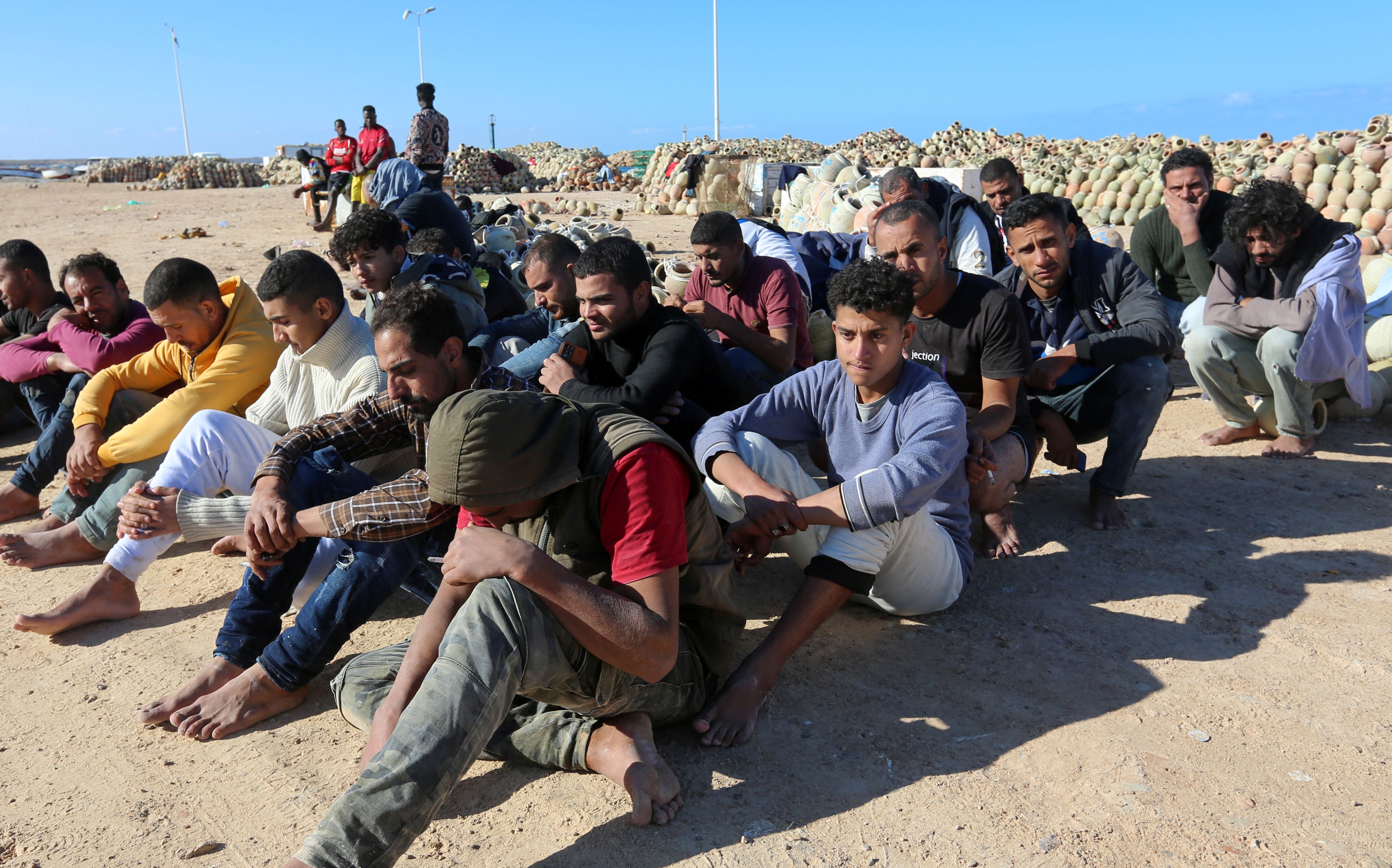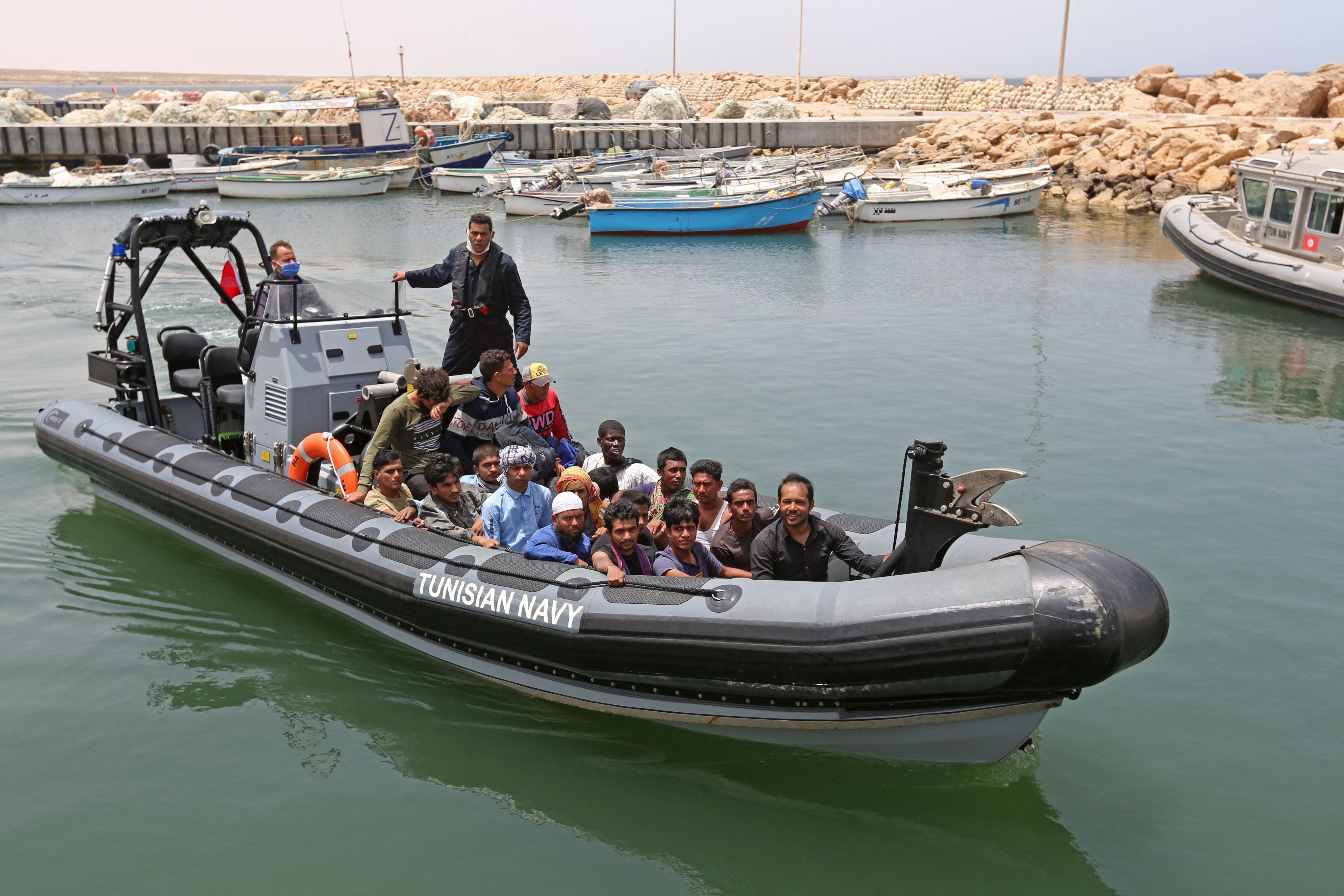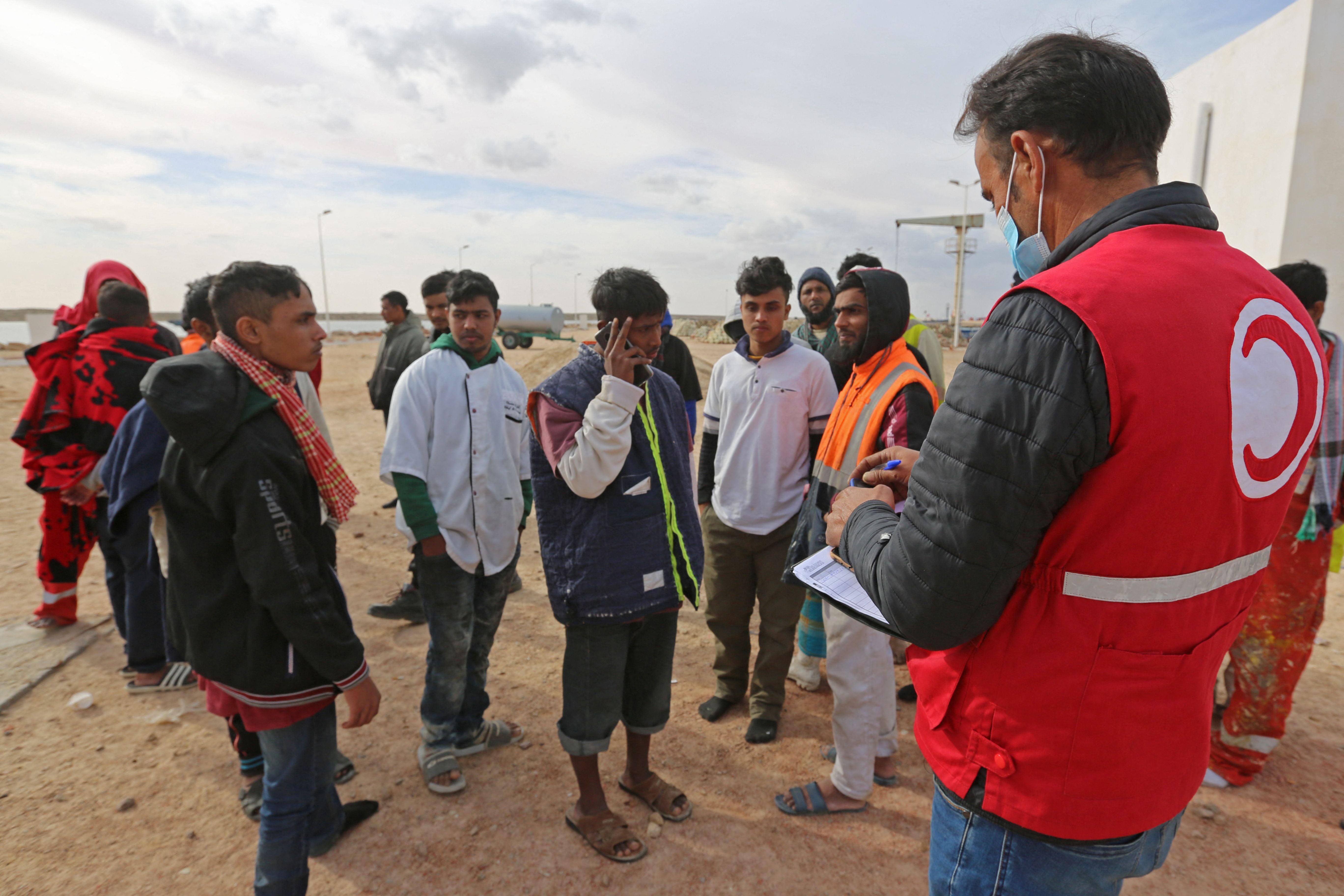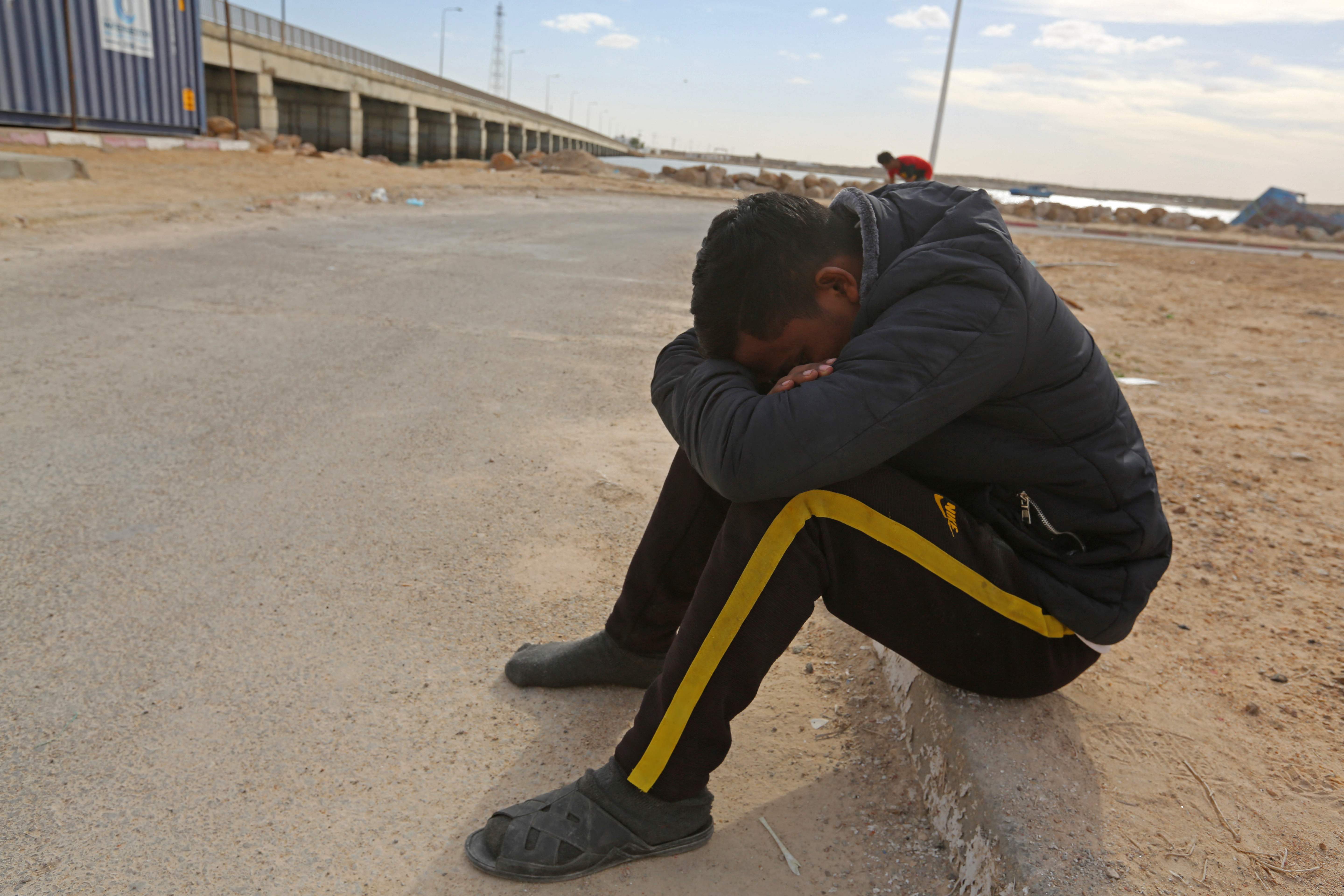‘There is no hope left’: More Tunisians risk their lives trying to reach Europe
Irregular migration from Tunisia has surged to levels unseen since the 2011 revolution, as the pandemic compounds economic turmoil and leaves young people with no prospects, writes Simon Speakman Cordall

Standing by the sea in La Goulette, a small fishing port to the north of Tunisia’s capital, 28-year-old Hatem reflects on his latest attempt to migrate to Europe.
Having scraped together 4,000 dinars (£1,027) from savings and loans from relatives, Hatem was hopeful his third effort to reach Italy would be successful.
Like a growing number of young Tunisians, he eschewed traditional smuggling networks and instead turned to “self-smuggling” – pooling his cash with others to arrange their own boat and pilot.
Yet things did not go to plan.
“I tried leaving clandestinely at the beginning of last summer, but [the Tunisian authorities] caught me and put me in prison for 15 days,” he says.
“I had a terrible time [in prison]. There was no social distancing. I got very sick,” adds Hatem – who only gives his first name – sitting against a backdrop of the Mediterranean Sea and the decaying palaces of Tunisia’s former rulers.
Despite his time behind bars and three failed attempts, Hatem is undeterred.
“I’ll try again. It’s a matter of life and death. I’ll either die at sea or keep trying,” he tells The Independent.
Hatem is far from the only one, with economic strife compounding the disillusionment that continues to hold sway 11 years after a revolution the country hoped might herald a new dawn.
Since 2020, irregular migration from Tunisia has soared to its highest levels since the 2011 revolution – with tens of thousands of people risking their lives at sea in search of a better life.
Tellingly, Tunisia has in recent years overtaken war-torn Libya as the top country of origin of migrants to Europe.
As for the future, there is nothing
Last year, more than 15,000 Tunisians arrived by boat in Italy – the gateway to the European Union for migrants from across Africa – according to data from the International Organisation for Migration (IOM).
Tunisians accounted for nearly 24 per cent of all arrivals – far more than any other nationality.
Furthermore, Tunisian authorities intercepted at least 23,250 irregular migrants, such as Hatem, who were attempting to depart from the country’s shores last year – double the figure for 2020.
The statistics are a damning indictment of Tunisia’s progress since the revolution, as well as the current state of its economy.
In La Goulette – close to many of the departure points that line Tunisia’s coast – few young men interviewed by The Independent have any intention of remaining in the country.

One of them, 25-year-old Ahmed Trabelsi, wishes to go abroad but feels obliged to stay at home to care for his sick mother.
“The harga (irregular migration) often crosses my mind. It’s not difficult to arrange, but I need to stay with my mother. We get by on between 50 and 100 dinars (£12 to £25) a week,” says Trabelsi, who survives on state benefits and casual work.
“As for the future, there is nothing. There is no hope left in Tunisia … Some of my friends tried to go abroad. Some live there, some died trying.”
The central Mediterranean route, from north Africa to places such as Italy, is the deadliest maritime migration route in the world, with more than 1,500 people having died at sea in 2021, the UN says. At least 11 Tunisians died last week when their boat – which was carrying 32 migrants – sank near the Kerkennah Islands, off the east coast near to the city of Sfax.
In La Goulette at least, confidence remains high in the president, Kais Saied – whose extraordinary power-grab in July saw him shutter parliament, remove the immunity of its members, and institute a period of rule by presidential decree – while his appointed cabinet embarks upon his mission to reinvent the country’s constitutional fabric.
However, the public zeal that first greeted his actions – seen by many as vital to tackling corruption and political gridlock – has done little to anchor young Tunisians to a country battered by Covid, endemic joblessness, and economic decline.
Unemployment today stands at 18.4 per cent, up from 13 per cent in 2010 – the year before the revolution. A US dollar now gets you about 2.9 dinars, less than half of its value 12 years ago.
Every day, across Tunisia, families face the unavoidable signs that life is getting more expensive as opportunities are becoming fewer and further between. Moreover, for those uncertain of where their next meal may be coming from, Europe’s own cost-of-living crisis seems a remote concern.
What hope remained was all but crushed by the arrival of the pandemic and the government’s chaotic response, extending a parliamentary record that had seen years pass with no apparent understanding of the desperate financial situation – or any plan to offer optimism to those coming of age within striking distance of the wealth they imagined Europe held in store for them.

Furthermore, the country’s key tourism sector and ancillary industries – which account for about 14 per cent of GDP – have been shattered, leaving many people with no choice but to look overseas.
“The people I’ve talked to are saying there is no employment, no opportunities to work, and they wonder what they’ll have left to survive on,” Ahlam Chemlali, a researcher in Tunisia from the Danish Institute of International Studies, tells The Independent.
While migrants used to be predominantly young men from poorer parts of the country, more and more middle-class families are leaving with their children, according to Chemlali.
“For those that can’t afford to leave as a unit, the choice is even more brutal. They just make the decision that their children don’t have a future in Tunisia, so will be sent to relatives abroad while the parents stay here,” she says.
According to IOM data, about 2,500 Tunisian children arrived in Italy by sea last year, at least three-quarters of whom were unaccompanied, marking a dramatic demographic shift in migration to Europe.
“If people are deciding to send their children to Europe to live with relatives, then they really don’t believe there’s a future here for them. That’s the epitome of hopelessness,” adds Chemlali.
While public polls in Tunisia are largely taken with a pinch of salt, a study published in December by the Tunisian National Institute found that nearly one in five people wanted to migrate.
Yet critically, even for those Tunisians who do make it to Europe, the future is often bleak. Undocumented, some fall victim to criminal gangs, while many are subjected to racism.

While stemming migration remains a priority for European states – EU and Italian officials visited Tunisia last year and pledged hundreds of millions of euros in financial aid to encourage Tunis to better manage its borders – it does not appear to be a major concern for Saied.
His government appears happy to rely upon its security services to police its borders, while leaving the various international aid organisations there to operate in what is essentially a vacuum, researchers say.
For the European countries looking on, migration from north Africa and elsewhere in the world has increasingly come to be seen as a security issue, rather than a humanitarian one.
No matter how the phenomenon is addressed, it is only likely to become more pressing.
Irregular migration from Tunisia this year will probably exceed the levels seen in 2020 and 2021, according to a report published this month by the Global Initiative Against Transnational Organised Crime.
Speaking to unemployed young men in a computer games shop just off La Goulette’s main street, it is not difficult to see why that might be the case.
“Whoever says they want to stay in Tunisia either has a rich father or a family situation that holds them here,” says Oussama, who only gives his first name. “For anyone else, [migration] is the only logical choice.”






Join our commenting forum
Join thought-provoking conversations, follow other Independent readers and see their replies
0Comments